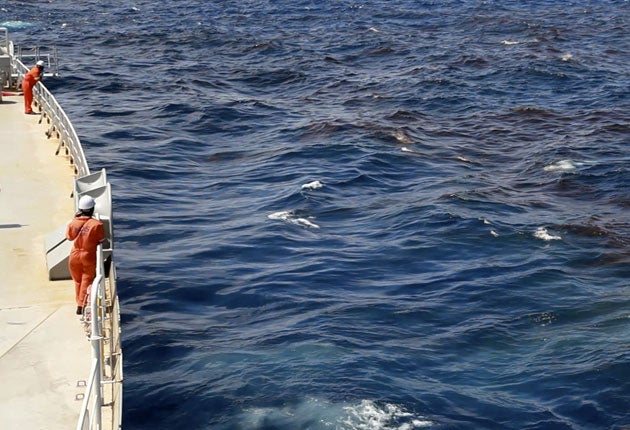A ship described by its owners as the world's largest oil skimmer was tested in the Gulf of Mexico at the weekend – and represents the latest hope for relief workers trying to clean up the mess from BP's Deepwater Horizon oil well, which has now been spewing crude into the ocean for 76 days.
The Taiwanese-owned vessel, A Whale, spent the weekend sucking up oily water from a 25-square-mile patch of sea just north of the leak site. Officials from the US Coastguard and BP were on board to assess its owner's claims that it could process half a million barrels of dirty water per day.
In theory, the 340 metre-long, 10-storey-high ship will collect polluted water from the surface of the sea using twelve slits, or "jaws" in the sides of its hull. The liquid will then be pumped through a series of tanks which decant the oil for storage on board, and then pump clean water back into the ocean. "In many ways, the ship collects water like an actual whale and pumps internally like a human heart," said Bob Grantham, a spokesman for TMT, the firm which owns the converted oil tanker. He described the skimmer as "the best solution to the Gulf of Mexico spill crisis" saying it would float across the sea "like a lawnmower cutting grass".
Test results were due by this morning. If all has gone to plan, the ship could indeed be a game-changer. The 21 million gallons of oily water that the vessel's owners claim it can clean each day would make it roughly 250 times more effective than the flotilla of converted fishing boats which have thus far been deployed against the spill.
At present, anywhere between 35,000 and 60,000 barrels of oil are gushing into the Gulf each day, and even when weather conditions are good, relief workers are able to contain or burn off only 25,000. In total, just half a million of the estimated three million barrels of the oil that have spilled since 20 April have been accounted for. There is no prospect of actually stopping the leak until August, when two relief wells are expected to be completed by BP.
A Whale, which operates under a Liberian flag and was converted from a normal oil carrier in a Portuguese shipyard at its owner's expense, arrived in Louisiana on Wednesday. However the US coastguard and BP did not allow it to commence skimming the Gulf until Saturday.
That angered those critical of the way the clean-up operation has been handled, most notably Bobby Jindal, the Republican governor of Louisiana, whose shoreline is bearing the brunt of the spill. "They've used the war rhetoric," he said. "If this is really a war, they need to be using every resource that makes sense to fight this oil before it comes to our coast."
Not everyone is convinced that A Whale will work, however. Its size means it can be used only in areas where a half-mile radius of sea is kept clear of other ships. And no one knows if the treated water it pumps back into the sea will meet environmental standards.
Many experts say the nature of the Gulf spill means that skimmers are ineffective. "In a case like the Exxon Valdez spill, where you had a lot of oil on the surface in a confined area, a vessel like this could have gone in and sucked up a whole lot," said Dennis Bryant, a former US coastguard. "But in the Gulf, where the oil is pretty well dispersed over a vast area, I don't see how it's going to make a large dent."

Join our commenting forum
Join thought-provoking conversations, follow other Independent readers and see their replies
Comments